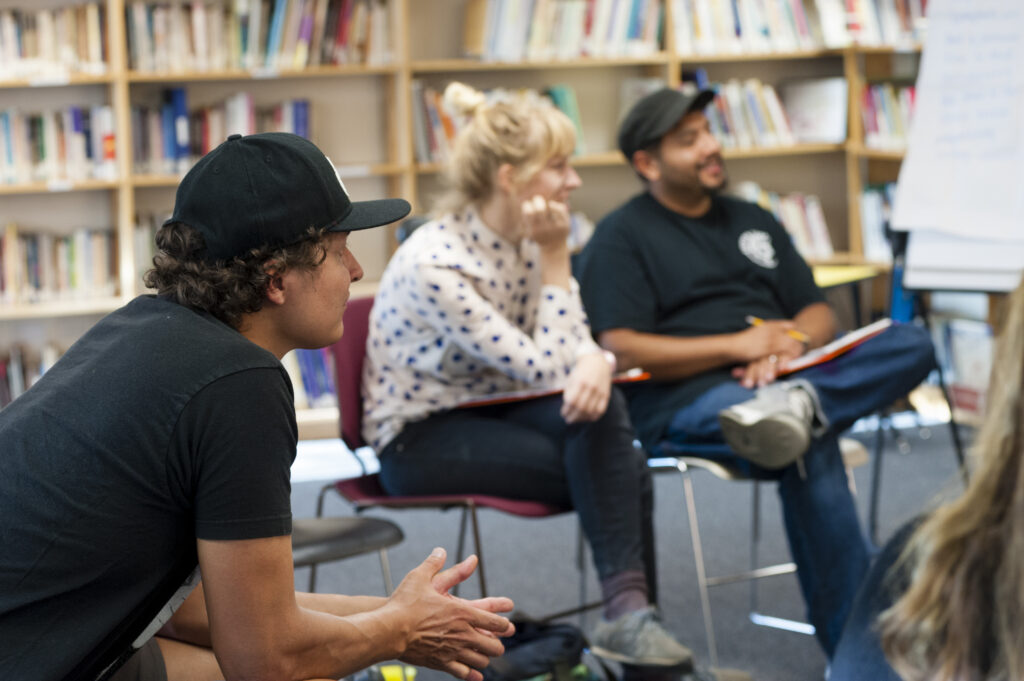● hands-on training and support
● educational opportunities
● meaningful work
● personal growth
● connections with amazing people
● opportunities to acquire new skills
● the benefit of working in a wonderfully positive work environment!
The Conflict Center is seeking members of the community to add to our pool of highly qualified instructors! We are looking for individuals who share our values of inclusiveness, relationship building, peaceful conflict and anger management.
At The Conflict Center, we are committed to diversity in our workplace and are also seeking individuals who reflect the diverse populations we serve. Our ideal candidate is someone who is comfortable working with both adults and youth in a variety of settings, has daytime availability/flexible schedule, and who is interested in having a long-term working relationship with TCC.
Contract instructors complete a yearly consultant agreement with The Conflict Center and accept assignments as desired, based on TCC’s training needs. To stay active in our contract pool, we ask that you accept at least two instructor opportunities (classes or workshops) per year.
● hands-on training and support
● educational opportunities
● meaningful work
● personal growth
● connections with amazing people
● opportunities to acquire new skills
● the benefit of working in a wonderfully positive work environment!

Social Norming: Uses “positive peer pressure” to educate students about what positive, healthy behaviors are truly acceptable by their peers. In our healthy relationship campaigns, specifically, we focus on helping students understand six common types of abuse: physical, emotional, sexual, stalking, financial/economic, and digital.
Rethinking Conflict Class: This anger management course for youth teaches how to make healthy decisions, identify emotions – especially anger – and manage them in healthy, effective ways.
———————————————————————————————-
Addressing Conflict and Anger Effectively: This class covers how to use conflict as an opportunity for growth and understanding. The techniques we teach help participants cool down, manage stress and learn how conflict can be a force for positive change.
Organizational Workshops: Our menu of interactive and dynamic workshops can be customized to your specific group — for-profit companies, non-profit organizations, faith-based communities, neighborhood groups, clubs or interest groups, and more.
———————————————————————————————-
Restorative Practices Program: An intentional restorative approach fostering a compassionate, relationship-centered culture. Research continues to demonstrate the beneficial outcomes of using restorative practice techniques in schools, rather than traditional punitive approaches, in response to student misbehavior. These include improving student attendance, better academic outcomes, and improvement of overall school climate.
———————————————————————————————-
Restoring Respect is a course that teaches restorative parenting, a philosophy that emphasizes building strong relationships in families, setting mutually age-appropriate boundaries for youth and guardians, and repairing harm when boundaries are crossed. Participants will also learn awareness of different parenting styles. At the heart of restorative practices in parenting is the strengthening of the relationship between parent/guardians and children, while at the same time, holding children accountable for the impact of their actions.
———————————————————————————————-

Simply put — we teach people to solve problems and build relationships. We want families, schools and communities to put themselves at the center of nonviolence. Our programs equip people with skills to navigate conflict productively.
* indicates required